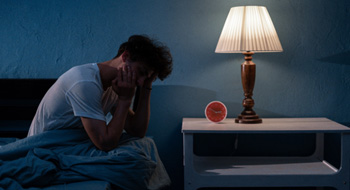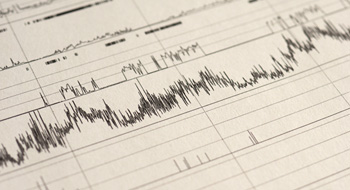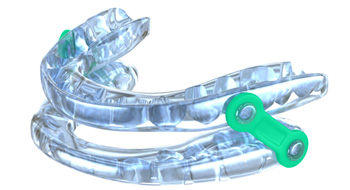Sleep Apnea Treatment Daytona Beach
Making Your Nights More Restful
No matter how early you go to bed, you still feel exhausted the next day. On top of that, your bed partner has been complaining about your loud snoring lately. Could these be warning signs of sleep apnea? If so, you need to act quickly to have the disorder treated so that you can get a good night’s sleep again. Once your sleep apnea has been diagnosed, Dr. Lloyd can help you treat it with a customized oral appliance. To learn more about how we can improve the quality of your slumber, give us a call.
Why Choose Indigo Dental of Daytona Beach for Sleep Apnea Treatment?
- Customized, Comfortable Oral Appliances
- Team That Offers Down-to-Earth Service
- Knowledgeable, Caring Dentist
What is Sleep Apnea?

When you have sleep apnea, you experience repeated interruptions in your breathing while you slumber. While this can sometimes be the result of the brain failing to send the right signals to the muscles that control breathing, more often than not the disorder is caused by a physical obstruction of the airway. Such obstructions can happen when the muscles in your throat or the back of your mouth collapse.
The pauses in your breathing can force your body to briefly wake up. This means your sleep will be interrupted frequently throughout the night, meaning you aren’t getting the rest that your body needs.
Sleep apnea is associated with many different symptoms, including loud snoring, chronic tiredness, morning headaches, and memory problems.
The Dangers of Sleep Apnea

If you have sleep apnea, you may feel unusually drowsy during the day. This can be very dangerous while you’re driving or working with heavy machinery, as there’s an increased risk that you may drift off at the wrong moment. On top of that, you’re likely to notice that you have trouble focusing, and you could even start experiencing symptoms of depression.
Furthermore, sleep apnea can raise your chances of suffering from serious medical problems. This can include heart attacks and other cardiovascular issues. As such, if you don’t have your sleep apnea treated as soon as possible, your life could be in danger.
At-Home Sleep Testing

Before you can have your sleep apnea treated, you will need to undergo a sleep test. In many cases, this can be done in the comfort of your own home. A special device will use sensors attached to your body to keep track of your breathing, oxygen levels, and more. Once the test is complete, a sleep expert can review the results and determine whether you have sleep apnea. After that, you can start exploring your options for treatment.
Sleep Apnea Treatment Options

CPAP therapy is the most well-known option for treating sleep-disordered breathing, but if you’re looking for an alternative, you can talk to our team about getting an oral appliance. When you wear said appliance, it will change the position of your jaw and help keep your airway clear throughout the night. This makes it less likely that your breathing will be interrupted, thus letting you get the quality slumber you deserve.
Sleep Apnea FAQs
Does Everyone Who Snores Have Sleep Apnea?
Although this is one of the various symptoms of sleep apnea, not everyone who snores throughout the night necessarily has this condition. Additionally, not everyone who has sleep apnea snores. That said, if you do typically snore loudly while resting, then you might be experiencing this situation and should get the necessary care to alleviate it. You’ll need to undergo a sleep study to officially diagnose yourself for sleep apnea.
Can I Diagnose Sleep Apnea on My Own?
Remember that just because you’ve noticed that you’re showing indications of sleep apnea doesn’t mean that you automatically have the disorder. You might even use a smartwatch to help take notes of your sleeping condition, but these products still won’t be able to tell you if you have the condition. That’s why you’ll always need to get a sleep test if you suspect that you’re struggling with sleep apnea. Before you can treat it, you’ll need to know what your diagnosis is and the specific kind of sleep apnea that you have, as your treatment will be tailored to your unique needs.
Why Should I See a Dentist for Sleep Apnea Treatment?
While it might not seem related to seeing a dentist for sleep apnea purposes, it’s important to remember that your dental professional is also an expert regarding the upper respiratory area. When it comes to obstructive sleep apnea, the tissues from your mouth and neck can incidentally prevent you from breathing properly. To keep this from happening, your dentist can effectively help reposition your lower jaw while you sleep so that those tissues don’t block your airway. Furthermore, if you regularly schedule checkups with your dentist every six months, you can easily consult with them about your situation instead of having to become established with a separate office.
Are There At-Home Remedies for Sleep Apnea?
There are various ways to help alleviate your sleep apnea symptoms at home. These can include products like weighted blankets which can make you more relaxed during bedtime. You can also practice things like avoiding bright screens before resting and staying active throughout the day to help you sleep. However, it’s always best to seek professional treatment for sleep apnea, which may involve options like oral appliance therapy and CPAP therapy—both of which typically have much more impactful and long-lasting benefits when it comes to your quality of sleep. While at-home remedies can minimize your symptoms, you want a treatment that will target the true cause of the issue by allowing your airway to be unbothered.
